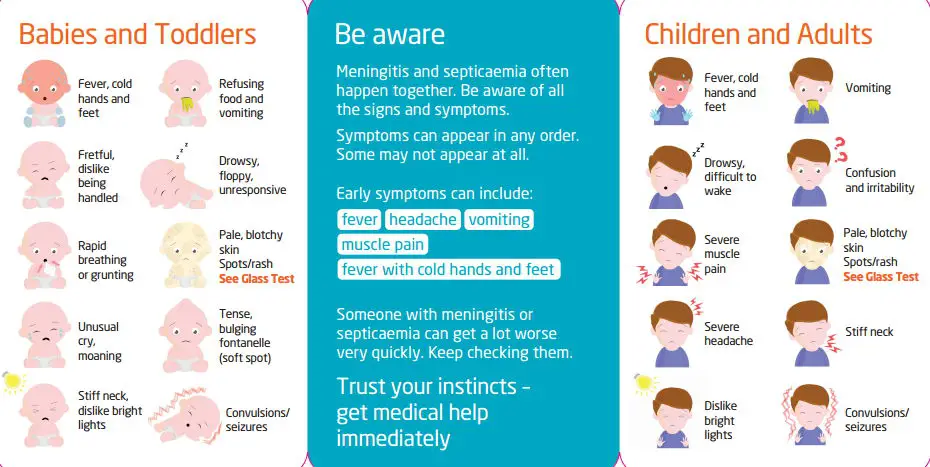This in from Andy on behalf of Meningitis Now. Ed
September sees the start of the meningitis peak season, so the charity is urging parents, students and teachers to be vigilant to the signs and symptoms and download its free phone app or request a symptoms card.
While children under 5 are most ‘at risk’ from meningitis, teenagers and students are the second most ‘at risk’ group (aged 15 – 23 years). It is estimated that 10% of the population carry the bacteria which can cause meningitis and septicaemia (blood poisoning), but this increases to about 25% for students.
The meningitis risk increases during the colder months as people spend more time indoors, closer to others; meaning germs are spread more easily. Fighting common infections like colds and flu weakens immune systems, leaving them more vulnerable to the disease.
Sue Davie, Chief Executive of Meningitis Now, said:
“Meningitis can be a difficult disease to spot – particularly at this time of year – as many of its early symptoms can be similar to those of flu.
“We urge everyone to download our app or get a card, familiarise themselves with the symptoms, trust their instincts and get urgent medical help if concerned. Doing this could save yours or a loved one’s life.”
Over 3,000 reported cases per annum
Every year about 3,200 cases of bacterial meningitis and septicaemia are reported in the UK – leaving 10% of victims dead and 15% of those who survive with severe after-effects such as brain damage, hearing and sight loss and, where septicaemia has occurred, limb loss and scarring.
It is a disease that can kill within hours, so knowledge of the symptoms, vigilance and quick action are vital.
The symptoms
Symptoms can include fever with cold hands and feet, vomiting, headache, stiff neck, dislike of bright light, joint or muscle pain, pale blotchy skin, drowsiness and confusion, and in babies, a dislike of being handled, an unusual cry, rapid breathing and bulging fontanelle.
Adults and children may also have a rash that does not fade under pressure. Symptoms can appear in any order and some may not appear at all. Advice from Meningitis Now is not to wait for a rash, the symptom most commonly associated with meningitis. This doesn’t always appear and can appear late. If concerned, seek urgent medical attention.
Find out more
Meningitis Now’s free signs and symptoms phone app and credit card-sized signs and symptoms cards for people to keep in a wallet or purse are available by calling its freephone helpline on 0808 80 10 388, or visiting the website at www.meningitisnow.org.
The charity will support anyone who has experience of meningitis. For further information on how to access these services call the helpline on the above number.





